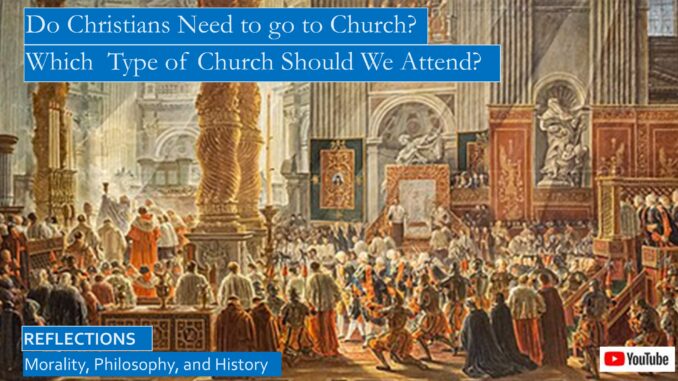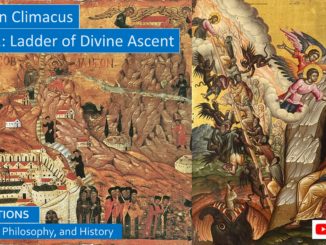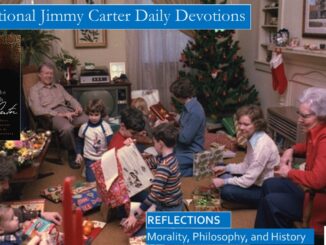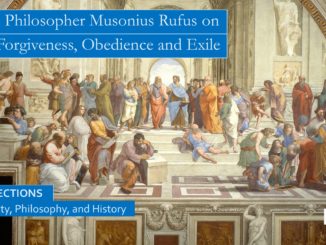
Do Christians Need To Go To Church?
This is a common question many have, sometimes the question is an honest question, sometimes the question is posed by hostile skeptics. St Augustine answers this question memorably in his testimonial book, Confessions, which we will discuss, and we will briefly discuss some related questions, such as, Why should I attend church? What is the best type of church to attend?
My internet persona is purposely vague as to which denomination I call home, there are many respectful channels that compare themselves to other Christians, this is not one of them. I am respectful of all legitimate Judaeo-Christian traditions, seeking moral truths where I find them, including moral and stoic philosophy.
YouTube video: https://youtu.be/LvfH9DIAVxU
YouTube script with book links: https://www.slideshare.net/BruceStrom1/do-christians-need-to-go-to-church-what-type-of-church-should-you-attend
The first question to ask is always, is the question framed properly? Is the question itself absurd?
Let us re-frame the question in another context. We know that all the major college football teams have booster clubs. My barber many years ago was a lady who was a rabid Seminoles fan, when you walk into her shop you would think you had walked into a football memorabilia museum, with the autographed posters of football players and coaches, and the banners, and the footballs and the helmets, and she was always enthusiastically talking about all the games she drove all the way to Tallahassee so she could hoot and holler in the stands.
Clearly, these football boosters never ask these questions: Why should I go the Seminole football games? Couldn’t I be a true Seminole booster without going to the games? These questions are simply absurd.
So, wouldn’t it be also absurd for Christians to ask why they have to go to church, if they are truly Christian?
So let us ask the question in another way. You have no doubt heard the often-told joke, What is the difference between those who go to the beach on Sundays, and those who go to church on Sundays?
The answer is those who go to the beach on Sundays don’t go to church on Sundays because they don’t think they need to change, while the people who go to church on Sundays think they don’t need to change neither, because they go to church.
To be truthful, we really do not want a Jesus who expects us to help Him carry his cross, we want a Jesus who takes the cross off our back, we want a Jesus who makes us happy. The ugly truth about life is, if we truly try to live a godly life, sometimes we will be happy, and sometimes, not so much.
To recast the message in our joke, people generally do not want to commit to a church, or synagogue, because they do not want a god who tells them how to live their life. But when we commit to living a godly life, we prefer to recast our god and his message into a god that tells us what we want to hear.
You can see this in our channel views, one of our projects is to reflect on the teachings in Scripture, the Church Fathers, and the moral philosophers on the Ten Commandments. By far, these videos are the least popular videos on our channel. People always want to believe that they root for the winning football team, and likewise, enthusiastic converts always want to argue that their denomination are the only true Christians, and those are the videos that draw the views.
We believe in a stoic view of Christianity, that Christ did not die on the cross to relieve us of our sufferings, Christ died on the cross to show us how to endure our sufferings, and Christ can give us the strength to deal with our sufferings, if we but ask Christ to grant us this strength.
What do the Scriptures exhort us to do? This is always a primary concern. Hebrews, in the New Testament, has the clearest instruction:
Let us consider how we may spur one another on toward love and good deeds, not giving up meeting together, as some are in the habit of doing, but encouraging one another—and all the more as you see the Day approaching.[1]
What exactly does it mean to encourage one another? We will ponder this further.
There are other bible verses commonly cited that come close, this is one good list:
https://www.fanawards.com/best-bible-verses-about-going-to-church
There are several psalms that very clearly state how we should long to be close to God. Psalm 84 explicitly pines to be in the house of the Lord. Psalm 84 begins:
How lovely is your dwelling place,
O Lord of hosts!
My soul longs, indeed it faints
for the courts of the Lord;
my heart and my flesh sing for joy
to the living God.
Even the sparrow finds a home,
and the swallow a nest for herself,
where she may lay her young,
at your altars, O Lord of hosts,
my King and my God.
Happy are those who live in your house,
ever singing your praise.
The intervening verses are also beautiful, the Psalm concludes:
For a day in your courts is better
than a thousand elsewhere.
I would rather be a doorkeeper in the house of my God
than live in the tents of wickedness.
For the Lord God is a sun and shield;
he bestows favor and honor.
No good thing does the Lord withhold
from those who walk uprightly.
O Lord of hosts,
happy is everyone who trusts in you.[2]
This psalm is also named the janitor’s psalm, proclaiming that it would be better to be a janitor in the house of the Lord than to be a VIP amongst the ungodly.
Also beautiful is Psalm 42:
“As a deer longs for flowing streams,
so my soul longs for you, O God.
My soul thirsts for God,
for the living God.
When shall I come and behold
the face of God?
My tears have been my food
day and night,
while people say to me continually,
‘Where is your God?’”
This psalm was written for someone who is in exile in a foreign land, whose captors taunt him, who longs to return to the land of the House of the Lord.
Later the psalmist sings:
“I say to God, my rock,
‘Why have you forgotten me?
Why must I walk about mournfully
because the enemy oppresses me?’”
We remember how Jesus cried out from the cross, “My God, why have you forsaken me?” The psalmist sings:
“As with a deadly wound in my body,
my adversaries taunt me,
while they say to me continually,
“Where is your God?”
Why are you cast down, O my soul,
and why are you disquieted within me?
Hope in God; for I shall again praise him,
my help and my God.”[3]
St Augustine reflects on this psalm:
“Let us burn together with this thirst; let us run together to the fountain of understanding. Let us” “long for it as a hart yearns for a spring,” “let us long for the wellspring of which Scripture exhorts, ‘With you is the fountain of life.” “Long for the fountains of water. With God is the fountain of life, a fountain that can never dry up.” “God has everything that will refresh you. He is able to fill anyone who comes to Him. This is what I am thirsting for, to reach Him and appear before Him. I am thirsty on my pilgrimage, parched in my running, but I will be totally satisfied when I arrive.”[4]
St Augustine’s memorable reflection on our question appear in his Confessions, which is really one of the first testimonials. St Augustine tells us the story of Victorinus, a philosopher who studies the Gospels and the Church Fathers but declines to attend services, asking “Do the walls of the Church make you a Christian?” Victorinus was a learned man, an erudite pagan Platonic philosopher, the Word of the Lord spoke directly to him from the page, perhaps he felt intellectually superior to many simple Christians he knew.
In the words of St Augustine, in his studies Victorinus became “resolute, he was seized by the fear that Christ might deny him before the holy angels if he was too faint-hearted to acknowledge Christ before men, and he felt himself guilty of a great crime in being ashamed of the sacraments instituted by the Word of God in his lowly state.”[5]
God spoke to Victorinus in his heart, and the answer is that the walls of the Church DO make you a Christian, your public profession of faith is what makes you a member of the church and a Christian.
WHAT TYPE OF CHURCH SHOULD YOU SEEK?
In the fifth century St John Climacus wrote the Ladder of Divine Ascent, and it is one of the few monastic manuals that gives advice to the young monk on how to select the abbot and monastery whose guidance he will follow. Ancient monasteries were like a spiritual boot camp, monks are expected to follow the spiritual advice of their abbot without question. Of course, you need to allegorize this advice when you apply it to your life as a layman.
St John Climacus teaches us, “If we are prudent, we should test our helmsman (i.e., priest or pastor), so as not to mistake the sailor for the pilot, a sick man for a doctor, a passionate for a dispassionate man, the sea for a harbor, and so bring about the speedy shipwreck for our soul. But when once we have entered the arenas of piety and obedience, we must no longer judge our good manager in any way at all, even though we may perhaps see in him some slight failings, since he is only human. Otherwise, by sitting in judgment we shall not profit from our obedience.”[6]
Laymen cannot be closely directed by their priests or pastors like monks are by their spiritual fathers, or abbots, because laymen usually do not live out their daily life with their priests or pastors. But laymen need to be comfortable with the spirituality of their priest or pastor. If you pastor or priest tells you truth that needs to be heard that you do not like, you should still listen; and if they ask you to change your ways in a way you do not like, you should be very reluctant to go against their advice. This advice is more applicable to those Christians who see Confession as a Sacrament, Catholic and Orthodox, but this can also be applicable when you seek spiritual counseling for your marriage or other life problems, and can also be true for marriage counselors. When you select a church, moral teaching, and this trust for clergy, is far more important than convenience, music ministries, or whether you feel “spiritually fed” or entertained.
Another implication is that if you wish to develop a deep faith, study and reflection is needed. One observation of mine is when someone wishes to convert from their current faith tradition to another, their understanding of the faith tradition into which they were born is fragmentary, which makes it easier for them to bash what they left. Those who choose to study their own tradition often choose not to covert. Likewise, you should study the tradition you are considering converting to.
We can also profit from reflections in Yves Congar’s book, True and False Reform in the Church, that encouraged Pope John XXIII to call the Second Vatican Council. Soon after World War II, there was deep dissatisfaction in the Catholic Church, a sense that the church was on the wrong side of history. Yves Congar reflected on the role that the church should play in our lives, the lives of believers, his reflections are valid regardless of whether you are Catholic or not. He reflects that like Jesus, the church that is the bridegroom of Jesus is both human and divine, that, that is simultaneously imperfect and infallible, how the church is much larger than any individual clergyman, and how in ancient times the church as a whole was far less likely to be judged by the actions of a few individuals.
Yves Congar quotes St Augustine, “Wherever in my books I spoke of the church having neither spot nor wrinkle (Eph 5:27), it is necessary to understand this not as if the church were already like this, but I the sense that she is preparing herself to be, on the day when she will appear in her glory. At present, by reason of the ignorance and infirmity of her members, she has reason to say every day, ‘Forgive us our debts.’”
Yves Congar quotes St Ephrem, “The whole church is the church of penitents and the whole church is the church of those who are perishing.”[7]
[1] https://www.biblegateway.com/passage/?search=Hebrews+10%3A24-25&version=NIV
[2] https://www.biblegateway.com/passage/?search=psalm+84&version=NRSVCE
[3] https://www.biblegateway.com/passage/?search=psalm+42&version=NRSVCE
[4] St Augustine, From Expositions of the Psalms, Psalm 42, Ancient Christian Commentary, Old Testament, Volume 7, Psalms 1-50 (Downers Grove, Illinois: Intervarsity Press, 2008), p. 328.
[5] St Augustine, “Confessions,” Book VIII, chapter 3, p. 160
[6] St John Climacus, Ladder of Divine Ascent, Holy Transfiguration Monastery, p. 22, Step 4, Paragraph 6. I did not want to say “if you are clever and prudent,” because I wonder if the meaning of “clever” has changed and is still valid.
[7] Yves Congar, True and False Reform, Part 1, Section 1, pp. 97, 113.




1 Trackback / Pingback